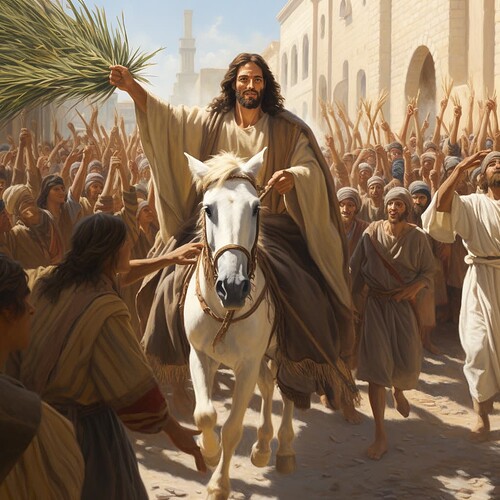![]() January 19: Matthew 21 - Jesus’ Triumphal Entry and Authority Challenged
January 19: Matthew 21 - Jesus’ Triumphal Entry and Authority Challenged
Reflecting on Jesus’ Kingship and His Challenge to Religious Authority
 Introduction
Introduction
On January 19th, our reading takes us through Matthew 21, a chapter filled with significant events in Jesus’ ministry. From His triumphal entry into Jerusalem to the cleansing of the temple and His parables, this chapter offers deep insights into Jesus’ authority and His challenge to the religious status quo.
 Triumphal Entry into Jerusalem
Triumphal Entry into Jerusalem
Matthew 21 opens with Jesus’ triumphal entry into Jerusalem, an event that fulfills Old Testament prophecy and symbolizes His kingship. This momentous occasion, marked by the crowd’s praises, signifies Jesus’ role as the Messiah.
Key Verse: “This took place to fulfill what was spoken through the prophet: ‘Say to Daughter Zion, ‘See, your king comes to you, gentle and riding on a donkey.’” — Matthew 21:4-5
 Cleansing the Temple
Cleansing the Temple
Jesus’ cleansing of the temple is a powerful demonstration of His authority and His commitment to restoring the sanctity of worship. His actions and words challenge the commercialization of religion and call for true devotion.
Key Verse: “‘My house will be called a house of prayer,’ but you are making it ‘a den of robbers.’” — Matthew 21:13
 Key Themes and Reflections:
Key Themes and Reflections:
Jesus as the Promised Messiah: The triumphal entry highlights Jesus as the fulfillment of messianic prophecies and the embodiment of God’s promise.
Authority and Reform: Jesus’ actions in the temple reveal His authority over religious practices and His desire to reform and purify worship.
Parables and Teachings: The parables Jesus tells in this chapter, like the Parable of the Two Sons, emphasize the importance of genuine obedience and repentance.
 Today’s Application:
Today’s Application:
Consider the significance of Jesus’ entry into Jerusalem and what it symbolizes about His kingship. Reflect on the areas of your life that might need ‘cleansing’ or reformation to align more closely with Jesus’ teachings.
 Hidden Gem:
Hidden Gem:
Did you know? The choice of a donkey for Jesus’ entry into Jerusalem, as opposed to a warhorse, symbolizes peace and humility, contrasting with earthly notions of kingship.
 Reflective Q&A:
Reflective Q&A:
![]() Matthew 21: Jesus’ Authority and Teachings
Matthew 21: Jesus’ Authority and Teachings
![]() Understanding Jesus’ Kingship: How does the triumphal entry deepen our understanding of Jesus as the Messiah?
Understanding Jesus’ Kingship: How does the triumphal entry deepen our understanding of Jesus as the Messiah?
A: The triumphal entry, fulfilling ancient prophecy, helps us understand Jesus as a king who brings peace and salvation, challenging our traditional views of power and leadership.
![]() The Significance of Cleansing the Temple: What message does Jesus convey through His actions in the temple?
The Significance of Cleansing the Temple: What message does Jesus convey through His actions in the temple?
A: By cleansing the temple, Jesus emphasizes the importance of sincere worship and condemns practices that corrupt or exploit religious spaces. It’s a call to prioritize spiritual integrity over outward rituals.
 Join the Discussion:
Join the Discussion:
How does Matthew 21 influence your perception of Jesus’ authority and His approach to religious practices? Share your thoughts and insights in the comments below!
#Matthew21 #Jesus #Messiah #BibleStudy #SpiritualJourney #NewTestamentReading
![]() Continue Exploring Matthew: Join us tomorrow as we delve further into Jesus’ teachings and actions in the book of Matthew.
Continue Exploring Matthew: Join us tomorrow as we delve further into Jesus’ teachings and actions in the book of Matthew.
 Join the forum!
Join the forum!
Enhance your spiritual journey in our AIgniteScripture Community:
Free Members: Join vibrant discussions and access a wealth of biblical resources. Join here: 🌟 How to Join Page - Membership Options
Supporters Membership ($20/month or $200/year): Gain access to personalized newsletters, exclusive forum access, and more. Join us to shape our community with your insights. Become a Supporter: 🌟 How to Join Page - Membership Options
![]() Stay Updated with our AIgniteScripture Newsletter: Keep up with daily readings and insights. Subscribe here: https://newsletter.aignitescripture.com/
Stay Updated with our AIgniteScripture Newsletter: Keep up with daily readings and insights. Subscribe here: https://newsletter.aignitescripture.com/
